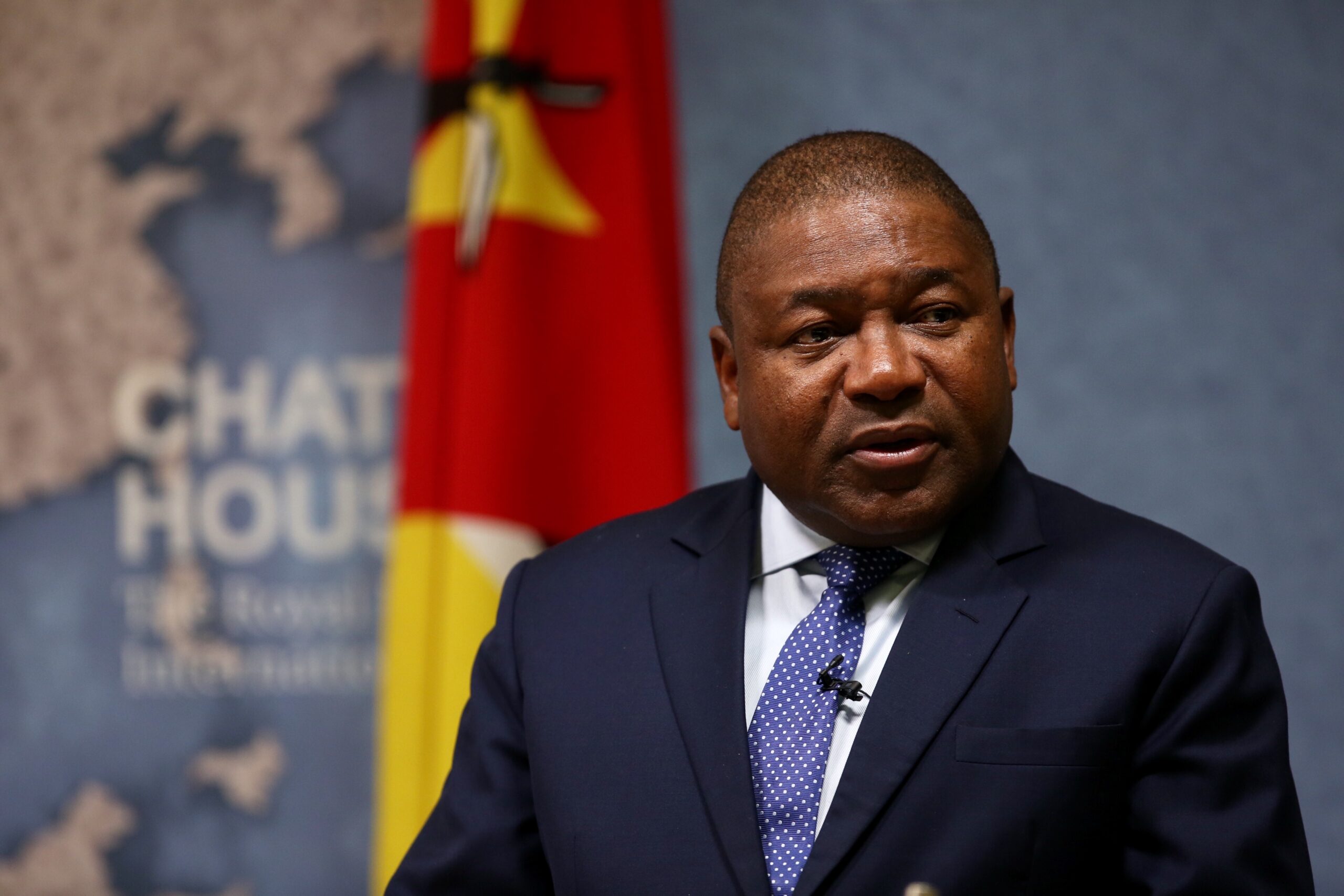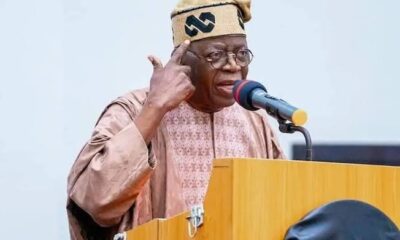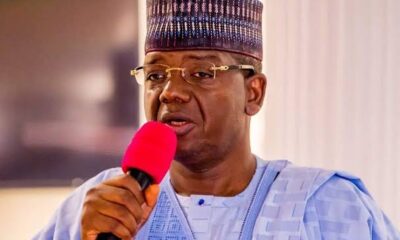Behind the News
Behind the News: All the backstories to our major news this week
Published
1 year agoon

Over the past week, there were many important stories from around the African continent, and we served you some of the most topical ones.
Here is a rundown of the backstories to some of the biggest news in Africa that we covered during the week:
Finally, Nigeria’s Bola Tinubu seals legal validation as president
On Thursday, Nigeria’s Supreme Court settled the prolonged legal disputes around the country’s president as it affirmed the decision of the tribunal dismissing the appeals of opposition candidates, Atiku Abubakar and Peter Obi, and upholding the election of President Bola Tinubu.
In a final attempt to overturn the election result, Abubakar and Obi urged the Supreme Court to dismiss a tribunal ruling on September 6 that upheld Tinubu’s victory. Their attorneys argued before the Supreme Court that the lower court erred in holding that the electoral agency’s pre-election guideline to electronically transmit polling place results was not a mandatory requirement.
The court, in its lead ruling, which was delivered by Justice John Okoro, rejected the Peoples Democratic Party’s (Abubakar’s) and the Labour (Obi’s) appeals contesting the ruling of the presidential election petition tribunal. The panel also concurred with Okoro’s decision to deny Atiku’s application to tender Tinubu’s CSU credentials as fresh evidence.
Even before the recent elections, the Nigerian president had long been surrounded by a cloud of controversy over his past, particularly related to his family, education, and business backgrounds.
Since the beginning of the current Fourth Republic in 1999, after years of military dictatorship, elections in Nigeria have been marred by controversy and violence, generating legal petitions. All presidential elections between the 1999 and 2023 exercises have ended up at the apex court except in 2015, when immediate past president Mohammadu Buhari defeated then-incumbent President Goodluck Jonathan.
More musings from the United States about Africa
During the week, a senior United States trade official, Constance Hamilton called for reforms to the country’s flagship trade initiative with Africa, claiming that it would increase its impact as part of a potential reauthorization by Congress.
The official, who is the Assistant United States Trade Representative for African Affairs, told journalists ahead of a meeting of US officials and African trade ministers in South Africa next week about the need for an improved strategy in US relations with Africa. “We need to do better”, she said.
The African Growth and Opportunity Act (AGOA), which was introduced in 2000, allows exports from eligible nations duty-free access to the American market. Although talks about whether and for how long to extend it are already underway, it is scheduled to expire in September 2025.
According to research, AGOA has aided in the creation of jobs and the reduction of poverty in some nations, especially for women. Nevertheless, from 2014 to 2021, more than 75% of duty-free non-petroleum exports to the US under the programme originated in just five nations: South Africa, Kenya, Lesotho, Madagascar, and Ethiopia.
Also, during the week, the US Senate rejected legislation seeking to have President Joe Biden withdraw American troops from Niger Republic.
Along with its push to reinforce its interest in Africa, Washington has been strongly involved in the battle against Islamist terrorists who have murdered hundreds and uprooted millions more in Africa, with its Department of Defence employing over 1,000 people nationwide.
In the last ten years, American forces have run two military camps in Niger, one of which is used to launch drone attacks on the Islamic State and an Al Qaeda offshoot in the area, and the other to train Nigerien forces in counterterrorism.
Washington is keen on regaining its waning influence amid an effort to highlight the region’s significance and combat any threats China and Russia may pose to American interests in this significant area.
Another Nigerian athlete in doping mess
Nigeria may be having an expanding doping scandal on its hands as another of its athletes, Grace Nwokocha has been banned for three years after she failed a drug test at the Birmingham 2022 World Championships.
As a result, the World Athletics Federation also stripped Nigeria of the
Commonwealth Games relay gold medal which Nwokocha was a part of.
In a statement announcing the ban on Friday, the AIU said the 100m and 200m athlete was banned for the “Presence/Use of Prohibited Substances Ostarine and Ligandrol.”
Two weeks ago, Nigerian sprinter, Divine Oduduru was also slammed with a six-year ban for two doping violations, including possession of prohibited substances and attempted use of a prohibited substance or method.
Another, former African 100m champion, Blessing Okagbare, was banned for 11 years for doping in 2022.
Beyond the short-distance track and field categories dominated by Nigerians, East Africans— especially Kenyans and Ethiopians— who have dominated long-distance races for decades, have also had athletes like 10 kilometres road race world record holder, Rhonex Kipruto, Betty Wilson Lempus and 800m specialist, Eglay Nalyanya, amongst others, banned, leaving a disturbing and damaging effect on the continent’s sporting image.
Mozambique’s ‘tuna bond’ scandal hits another high note
Mozambique’s President, Filipe Nyusi is now at the centre of the country’s “tuna bond” scandal as the owner of Emirati-Lebanese shipbuilder, Privinvest, Iskandar Safa, told London’s High Court that he was ultimately responsible for the failure of the projects at the centre of the “tuna bond” scandal.
The scandal’s notoriety began with the borrowing of $2.2 billion by three newly formed firms in 2013 and 2014, the majority of which was done without the legislature’s knowledge or authorization. Mozambique alleges that Privinvest and Safa conspired against it and distributed more than $130 million in bribes to dishonest government officials and Credit Suisse employees.
The “hidden debt” or tuna bond issue has sparked criminal investigations from Maputo to New York, as well as a string of related litigations in London involving Credit Suisse, Privinvest, Safa, and many other parties.
Safa, in his written witness statement, as he gave evidence by videolink from Paris, said, “Privinvest does not pay bribes, full stop,” and blamed the failure of the projects on Nyusi, whom he said “wanted the projects to fail” to undermine his predecessor, Armando Guebuza’s political authority.
The main focus of the accusations against Nyusi was the $11 million in payments that they said Privinvest made in 2014 to help Nyusi and his Frelimo party, which is presently in power, win elections. Privinvest and Safa said he ought to bear the financial burden of any reparations they could have to pay Mozambique in the event of a conviction.
You may like
-


Nigeria: 614,937 killed, 2.2m abducted in 1 year— Report
-


Nigeria obtains $600 million international loans for agriculture
-


Nigeria’s November inflation rate hits 34.60%
-


‘I don’t take pleasure in causing you pains,’ Tinubu tells Nigerians amid hardship
-


Nigeria’s Dangote Refinery exports first fuel to Cameroon
-


Nigeria: President Tinubu’s reforms, economic policies yielding positive results— Minister
Behind the News
Behind the News: All the backstories to our major news this week
Published
2 months agoon
October 18, 2024
Over the past week, many important stories from around the African continent were published, and we served you some of the most topical ones.
Here is a rundown of the backstories to some of the biggest news in Africa that we covered during the week:
Another look at Africa’s debt crisis
Conversations around Africa’s public debt were on the table during the week as Achim Steiner, administrator of the United Nations Development Programme, stated on Monday that the world’s poorest countries were unable to meet sustainable development targets because they had to prioritise debt payments over investments.
Addressing a gathering in Hamburg, Steiner asserted that the world financial crisis was impeding countries’ ability to accomplish the objectives, which include eradicating hunger and poverty, increasing access to healthcare and education, providing sustainable energy, and protecting biodiversity.
Since the COVID-19 pandemic’s pervasive effects on economies, the majority of the continent’s nations have suffered with both internal and international debt; yet, few have achieved much in the fight for debt restructuring under the G20 framework.
Numerous African nations, including Egypt, Tunisia, Nigeria, Ghana, Zambia, and others, are struggling with significant foreign debt. Together with Zambia and Ghana, Ethiopia will be a part of a thorough restructuring known as the “Common Framework.”
At the opening ceremony of the annual African Union summit in Ethiopia last year, UN Secretary-General Antonio Guterres made the case for changes to the international financial system’s structure to better meet the requirements of developing nations.
Africa’s whole external governmental debt as of 2021 was 726.55 billion USD. The amount of foreign public debt increased from 696.69 billion dollars in comparison to the previous year.
Concerns are being raised by the rising debt levels in Africa, which could not only hinder economic growth but also make repayment nearly difficult for many of these nations. This begs an important question: When does debt stop being beneficial and instead start to negatively impact a nation’s economic performance?
Kenya remains committed to Haiti, but what does it stand to gain?
Kenya will support an international anti-gang effort in Haiti next month by dispatching an additional 600 police officers there. Haiti’s prime minister was in Kenya to expedite the deployment of the military.
At least eleven countries have pledged to send more than 2,900 soldiers to participate in the Multinational Security Support (MSS), led by Kenya.
Kenya, whose participation in international peacekeeping missions is longstanding, declared earlier this year that it would be deploying 1,000 police personnel, citing as a starting point its assistance to a bordering country.
Approximately 600,000 individuals have been internally displaced due to gang conflict, and hundreds of thousands of aspiring migrants have been deported back to Haiti, where approximately 5 million people are facing extreme famine. October marks the end of the mission’s first 12-month term. As gang violence worsened in 2022, Haiti turned for the first time to foreign assistance.
Nevertheless, it failed to identify a leader prepared to assume the helm and numerous foreign governments were reluctant to back the unelected administration in the desperately poor nation.
Kenya gains significant political value by sending its troops to Haiti on the international scene. Kenya has gained international recognition as a trustworthy ally that is eager to assist other nations. The mission opens up various opportunities. Prior to deployment, Kenyan law enforcement forces will receive specialist training and equipment. In the long term, this will increase the force’s capacity. Of course, there are monetary rewards as the participating nations receive allocations of resources. Because troops will receive additional pay, officers are very interested in being deployed overseas.
Cameroon: ‘Healthy’ Biya remains out of sight
Cameroon’s president, Paul Biya can now be likened to the proverbial cat with nine lives as the 91-year-old has remained “healthy” following latest reports of his death during the week. Rumours have been circulating about Cameroonian President Paul Biya’s possible death in a military hospital in France due to his extended absence. This rumour stems from Biya’s prolonged absence following the September China-Africa Summit when he was anticipated to head back to Cameroon almost away.
As of November 6, 1982, Biya, who is 91 years old, has been in office for 42 years. He is the oldest head of state in Africa, the longest-lasting non-royal national leader worldwide, and the second-longest serving president overall. According to rumours, Biya’s oldest son Franck Emmanuel Biya may be named as his replacement for “continuity” in France.
Since its political independence from France and Britain in the early 1960s, Cameroon has only had two presidents. The country is currently dealing with two serious crises: a deadly Boko Haram insurgency in the north and a separatist conflict that has claimed thousands of lives.
President Biya is one of several long-serving African leaders, including Yoweri Museveni of Uganda, who has been in office since 1982, and Teodoro Obiang Nguema Mbasogo of Equatorial Guinea, Rwanda’s Paul Kagame is also gradually evolving into the group.
Things get tougher for embattled Kenyan Deputy President
During the week, the deputy president of Kenya was impeached by the National Assembly due to charges of corruption and abuse of power. In a vote held Tuesday night, lawmakers decisively decided to remove Rigathi Gachagua from office. The Senate will now decide what will happen to the deputy president.
Parliament adopted a proposal to remove Kenya’s deputy president from office, and on Wednesday, the matter was brought to the Senate for consideration. The National Assembly heard a nearly ninety-minute defence of troubled deputy president Rigathi Gachagua and his allies prior to the vote.
A surge of protests targeting President Ruto’s government has been occurring in Kenya over the last four months due to accusations of corruption made by certain lawmakers and government officials. High taxation and the parliament’s purported inability to act independently of the president were other issues that Kenyans objected to. Gachagua refutes the accusations made by certain lawmakers, who claim that the deputy president assisted in planning rallies against the government.
He supported Ruto in his election victory in 2022 and assisted in obtaining a sizable portion of the vote from the populated central Kenya region. Gachagua, however, has mentioned feeling marginalised in recent months, despite extensive claims in the local media that he and Ruto have strained political ties.
After widespread protests over unpopular tax increases in June and July that claimed more than 50 lives, Ruto sacked the majority of his cabinet and appointed members of the main opposition.
Gachagua infuriated many in Ruto’s coalition by comparing the government to a business and implying that people who supported the coalition had first claim to development projects and jobs in the public sector. Ruto has not yet publicly commented on the impeachment proceedings.
Behind the News
Behind the News: All the backstories to our major news this week
Published
3 months agoon
October 3, 2024
Over the past week, many important stories from around the African continent have been published, and we have served you some of the most topical ones.
Here is a rundown of the backstories of some of the biggest news in Africa that we covered during the week:
Musings on CBN rates across Africa: Ghana, Nigeria, and South Africa
During the week, many African countries announced monetary policy decisions. The Central Bank of Nigeria decided unanimously on Tuesday to raise its benchmark interest rate by an additional 50 basis points, to a new record high of 27.25%. This is the sixth hike in a row this year. The decision was made in an effort to reduce inflation, strengthen the naira, and draw in capital. Governor Olayemi Cardoso reaffirmed the bank’s commitment to controlling inflation and underlined how several rate hikes have contributed to its moderation.
Nigeria’s West Africa neighbour followed suit on Friday as the Bank of Ghana reduced its benchmark monetary policy rate by 200 points to 27% at a normal meeting. With inflation having slowed and disinflationary pressures mounting, this is the first decline in eight months and the steepest since March 2018. August 2024 saw a fifth consecutive month of decline in Ghana’s annual consumer inflation, which was still much higher than the central bank’s medium-term target range of 6% to 10%. The country’s annual inflation rate dropped to a nearly two-and-a-half-year low of 20.4% from 20.9% in July.
A week prior, as anticipated, the South African Reserve Bank decreased its benchmark interest rate by 25 basis points to 8% after holding seven consecutive meetings at a 15-year high of 8.25%. As price pressures decreased, the SARB is loosening policy for the first time since the epidemic in 2020
As monetary varying shifts across the continent continue, African nations are still facing numerous severe shocks and significant structural challenges, such as rising food and energy prices brought on by geopolitical tensions like Russia’s invasion of Ukraine, climate issues that impact agriculture and energy production, and ongoing political instability.
Africa’s real GDP growth slowed to 3.1% in 2023 from 4.1% in 2022 as a result of this difficult climate. With growth predicted to reach 3.7% in 2024 and 4.3% in 2025, the economic picture is projected to improve going ahead, underscoring the resilience of African countries.
Zambia and its post-drought plans
Zambia’s finance minister, Situmbeko Musokotwane stated on Friday that the nation intends to quickly recover from its worst drought in living memory and cut its budget deficit in half the following year.
The minister stated in a budget address that the copper producer hopes for a 6.6% growth in 2025, as opposed to a projected 2.3% increase in 2024. The country is aiming for a speedy recovery. as the government crop assessment data shows that over nine million people are affected in 84 of the 117 districts after suffering through the driest farming season in over forty years, which has led to considerable crop losses, an increase in livestock deaths, and worsening poverty,
Real GDP increased gradually between 2022 and 2023, from 5.2% to 5.8%. The supply side was driven by mining and quarrying, wholesale and retail commerce, and agriculture; the demand side was driven by consumer and business spending. Food prices, transit expenses, and the nominal exchange rate are the key drivers of inflation, which is expected to remain elevated and reach 11.0% and 10.9% at the end of 2022 and 2023, respectively.
The economic challenges faced by Zambia are exacerbated by the drought, especially when considering its debt load. Its debt restructuring talks under the G20 Common Framework have progressed far more slowly than was originally anticipated when the Common Framework was first proposed.
In 2017, Zambia was placed under debt distress, and as a result, non-concessional lending from multilateral development banks was discontinued. It’s possible that by overestimating sovereign risks, the main credit rating firms exacerbated the debt crisis and dealing with a post-drought crisis might just be another “too high hurdle”
As the World Bank and Uganda LGBTQ saga continues
The World Bank is taking more action in support of Uganda’s LGBTQ community. The global lender announced on Wednesday that it is implementing steps to guarantee that lenders to Uganda are not subjected to discrimination due to a severe anti-gay law. According to a World Bank representative, both new and continuing projects would be subject to the procedures, which also include an impartial monitoring system to guarantee compliance.
Same-sex partnerships are forbidden and punishable by life in prison; similarly, anyone convicted of “aggravated homosexuality” faces the death penalty. The Anti-Homosexuality Act (AHA) was passed by Uganda, a largely conservative nation, in May of last year and it has led to considerable Western censure and US penalties.
Other than Uganda, several African nations have strict laws that discriminate against individuals who identify as LGBTQ. Hakainde Hichilema, the president of Zambia, issued a warning in March to supporters of the LGBTQ movement to stop endorsing homosexuality. He also asked that Zambia “maintain laws that abhor alien orientations like gayism and lesbianism.”
South Africa, which has a constitution that forbids discrimination based on sexual orientation, was the first and only African nation to legalise same-sex marriage in 2006. Some African nations, such as Angola, Mozambique, Botswana, Lesotho, Mauritius, and Seychelles, have laws that are favourable to the continent’s population but Uganda appears to be unbothered or tempted despite the many causes and costs of its anti-gay stand.
Ahead of Tunisia’s presidential election
During the week, another Tunisian presidential candidate Ayachi Zammel was convicted and sentenced to six months imprisonment for using “fraudulent certificates” as opposition voices in the North African country continue on attack as President Saied positions himself for what is likely to be a reelection, as all but one of the opposition candidates are either incarcerated or have had their eligibility ruled invalid by the Tunisian electoral commission.
On September 19, a third candidate who had received the election commission’s approval was sentenced to 20 months in prison. Saied, who is currently running for reelection for a second five-year term, was originally elected in 2019 as an anti-establishment candidate who pledged to combat poverty and eradicate corruption. However, in 2021 he declared that he would rule by decree after overthrowing Mohamed Ennaceur and the elected parliament, a move denounced as a coup by the opposition and the international community.
Additionally, he has deployed more oppressive strategies, which may indicate that he is not confident in his ability to win with conviction. His severe actions could indicate a new stage in Tunisia’s democratic backsliding and foreshadow more crackdowns and turmoil during an inevitable second term.
Meanwhile, concerns exist over potential voting turnout as well. Under Saied, Tunisia has conducted three elections, with dismal voter turnout in each. Less than one-third of voters cast ballots in favour of a new constitution that solidified Saied’s power and overthrew the 2014 charter in July 2022. After Saied dismissed the previous legislature in December 2022, only 11% of voters cast ballots for new members of parliament, which is among the lowest turnout percentages ever recorded in a national election worldwide. The next December, Saied called elections for a new second house of parliament, repeating this dubious performance.
EDITOR’S PICK


DR Congo sues tech giant Apple over illegal mineral exploitation
The Democratic Republic of Congo (DRC), has filed a criminal case against the European subsidiaries of tech giant, Apple, accusing...


UNESCO lists Ghana’s Kente cloth as cultural heritage
The iconic Ghanaian Kente, a piece of clothing, has been recognized as a cultural heritage on UNESCO’s Representative List of...


Zambia: FOX report highlights persistent media harassment, calls for reforms
A new Freedom of Expression (FOX) report by the Media Institute for Southern Africa (MISA) Zambia, has raised concerns over...


Egyptian court upholds ex-presidential candidate Ahmed Tantawy’s sentence
Former presidential candidate, Ahmed Tantawy, and his campaign manager, Mohamed Abou El-Diar, were found guilty of faking election paperwork, and...


Court orders Uganda to compensate LRA war crimes victims
Uganda’s tribunal has ordered the government to pay up to 10 million Ugandan shillings ($2,740) to each victim of Lord’s...


Nigeria: 614,937 killed, 2.2m abducted in 1 year— Report
A new report released on Tuesday by the National Bureau of Statistics (NBS) has revealed that over 614,937 Nigerians were...


Seeking to expand ties in Africa, Indonesia’s Prabowo attends D-8 economic meeting in Egypt
According to the government, Indonesian President, Prabowo Subianto, travelled to Egypt on Tuesday to attend meetings of the D-8 Organisation...


M23 Angola peace talks break down as Congo, Rwanda dash hopes
Hopes of an agreement to end Congo’s M23 rebel conflict, which has displaced over 1.9 million people, were dashed when...


Nigeria obtains $600 million international loans for agriculture
To promote food security and rural development, the Nigerian government, through the Ministry of Agriculture and Food Security, has obtained...


Nigeria’s November inflation rate hits 34.60%
According to figures released by the statistics office on Monday, Nigeria’s inflation rate increased for the third consecutive month in...
Trending
-

 VenturesNow11 hours ago
VenturesNow11 hours agoNigeria’s November inflation rate hits 34.60%
-

 VenturesNow11 hours ago
VenturesNow11 hours agoNigeria obtains $600 million international loans for agriculture
-

 VenturesNow12 hours ago
VenturesNow12 hours agoIMF’s latest board reviews result in $182 million to Rwanda
-

 Politics12 hours ago
Politics12 hours agoGhana will not leave IMF but wants adjustments, says President-elect


